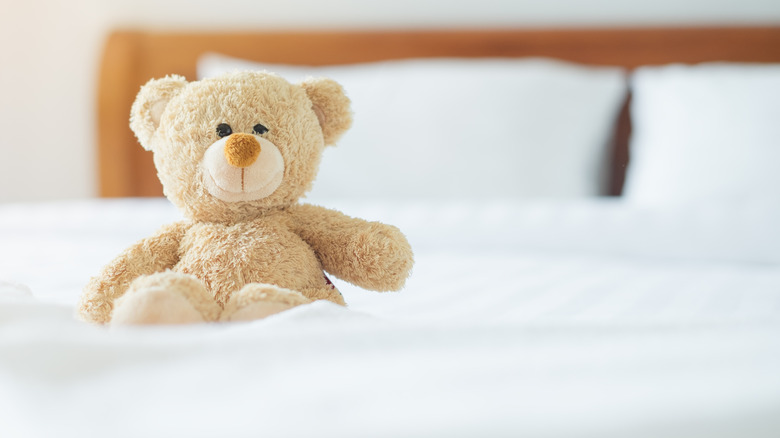If you’re an adult who still sleeps with a stuffed animal, you’re not alone. A 2024 survey by Build-A-Bear and Atomik Research found that 40% of adults cuddle up with a plush toy every night. Over half of respondents also indicated that their stuffed nighttime companion dates back to childhood.
Sleep psychologist Sarah Silverman has an explanation for why so many adults find comfort in sleeping with a stuffed animal (via Sleep.com). It all boils down to reducing anxiety. “Many bedrooms have turned into offices, gyms, and home schools, which can create a negative association between our increased stress level and the place we sleep,” Silverman explains. She added, “And sometimes we feel solace by simply having our favorite go-to items nearby.”
Pediatric psychologist Kevin C. Smith also weighs in on the phenomenon, stating, “For children, transitional objects such as a blanket, teddy bear, or doll can provide comfort as they transition from dependence to independence at night.” This childhood ritual follows us into adulthood and brings us the same sense of security.
Not only does sleeping with a stuffed animal bring us comfort and reduce our anxiety at bedtime, but it can also have a positive effect on our quality of sleep. Best Mattress Brand surveyed 2,000 Americans and discovered that people who slept with a stuffed animal as children were less likely to snore as adults, a reduction of 38%. Conversely, nearly 50% of respondents who had never slept with a stuffed animal snore as adults. So while adults going to bed with stuffed animals may help with sleeping, is it a healthy behavior?
Should you stop sleeping with a stuffed animal as an adult?

Adults who still sleep with a stuffed animal may face criticism or mockery from partners or others who discover their nighttime habit, per Well+Good. This can lead them to question whether it is appropriate to continue the habit. Behavioral health specialist Tracey Jones has some thoughts on the matter. Ultimately, the behavior serves to calm us and reduce loneliness and anxiety around sleep; however, continuing to sleep with a stuffed animal as an adult comes down to whether it is “helpful or damaging to one’s emotional integrity, daily function, and interpersonal relationships.”
An example of this habit proving harmful is if it starts to interfere with intimacy in our romantic relationships or if it causes ongoing fights (via Well+Good). It may also become detrimental if an individual can only sleep when cuddling or in the presence of their stuffed animal, as there may be times when it’s necessary to go without this sleep crutch, such as during travel.
The decision to stop sleeping with a stuffed animal is an individual one. However, if it makes sense for you to let go of this habit, clinical psychologist Inna Khazan has some pointers, she tells Well+Good. “I suggest gradually weaning yourself off until you no longer need the bear,” Khazan says. This may involve moving the animal farther away from you each night until you no longer need it in the bedroom when you sleep.